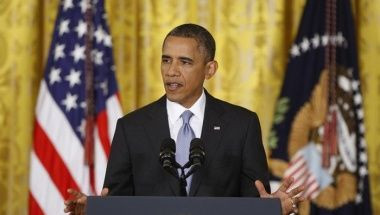State Of The Union Speech: Will Anyone Bother Watching Obama?

Perhaps the best thing that could happen to President Barack Obama during the State of the Union (SOTU) speech tonight would be if someone in the audience goes off the rails a la Justice Samuel Alito or, better yet, like Representative Joe Wilson did in the past. At least something like that could get Obama the audience he needs.
Think about it. How many people do you know who will be watching the president’s speech tonight? If the past is any predictor, very few will be. While the SOTU address is one of the most important speeches a president gives each year – and certainly the most hyped -- according to Nielsen, over the last several years fewer and fewer Americans have bothered to watch.
Last year, for instance, President Obama speech’s was one of the least-watched SOTU addresses in more than a decade. Despite the fact that the speech was carried live on most networks, only 33.5 million Americans tuned in, making it the lowest-rated SOTU since former President Bill Clinton’s final address in 2000. One thing worth noting that makes the decrease in viewership more remarkable is that it has occurred at the same time the number of news outlets has increased.
All recent presidents have had to contend with low viewership, particularly in their second term. What makes this all the more troubling for President Obama is that since the New Year, he has been talking openly about tools he can use to go around Congress if they continue to be obstructionist. And those few who do tune into the speech tonight are sure to hear him say once again, “I’ve got a pen, and I’ve got a phone.”
The pen, of course, is a reference to the fact that if Congress refuses to act, he will issue executive orders and utilize other forms of executive action to pursue his agenda. The phone refers to the notion that as president he can call people to the White House (as he did with college presidents last week) and urge them to work with him to pursue various policy goals.
What the president, his new senior aide John Podesta, and others fail to acknowledge, however, is while the president does have the authority to do this, there is only so much he can do with a pen and a phone. The truth is, like all presidents and in accordance with the wishes of the framers (and I would say with very good reason), he needs Congress to really move his most important and ambitious agenda items forward.
The president is right to be frustrated with Congress (although sometimes you get the sense he thinks he is the only president to feel this way). Nevertheless he has to work with them and this is why seemingly small issues like how many Americans watch the SOTU tonight is particularly important.
In 1960 Richard Neustadt published his classic book "Presidential Power," in which he showed that despite what we learn as grade school kids, the president’s power is limited on purpose, by design, and constitutionally. And in what may be Neustadt’s most famous line, he argued that “presidential power is the power to persuade” (as well as bargain). That is, in Neustadt’s estimation, the major way in which presidents can influence policy in a system as divided and separated as ours.
Which brings us back to Nielsen, Alito and Wilson. If Obama can’t bargain with Congress, he needs to persuade them. The best way he can do that is to use his bully pulpit to speak to the American people and urge them to pressure Congress into acting. Unfortunately, if people don’t tune in to hear him make his case, it doesn’t matter what he says or does going forward. The pen and phone do give a president some power, but it’s limited. His best bet now is to speak to the American people and hope they are listening.
Jeanne Zaino, PhD, is professor of political science at Iona College & Campaign Management at NYU-SCPS. You can follow her on twitter @JeanneZaino
© Copyright IBTimes 2024. All rights reserved.





















